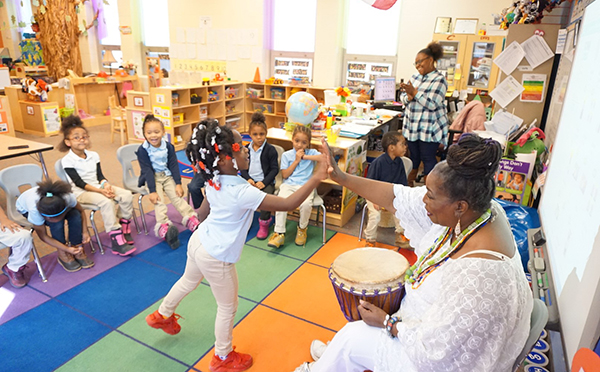- Home
- The MetroHealth Foundation
- Your Gifts At Work
- Collecting Data for Collaborative Change
Your Gifts At Work: Collecting Data for Collaborative Change: The Impact of I4HOPE

Since its creation in 2019, the MetroHealth Institute for H.O.P.E.™ (I4HOPE) has fostered greater understanding of the many factors that can affect individuals’ ability to live a healthy life. Known as the Social Drivers of Health, these factors may include housing status, income levels, education, employment, food access, social connections and more.
To better understand the health-related social needs of MetroHealth patients, I4HOPE has screened nearly 160,000 individual patients to assess their risks for 11 needs-related domains.
Now, I4HOPE is regarded as a national model for the advancement of health and well-being, especially through its use of data to best understand the needs of the community and to develop the most effective ways to help.
Data collected through patient screenings has been used to develop innovative programs, including the Food as Medicine (FAM) Clinic, which is changing the lives of MetroHealth patients like Rafael Cruz.
Rafael, who has Type 2 Diabetes, screened as at risk for food insecurity and his doctor referred him to the FAM Clinic, where he began receiving three-day supplies of nutritious food for everyone in his household. Before he began attending the clinic in September, Rafael’s hemoglobin A1C was a dangerously high 13.3. This persistently high blood glucose led to complications of other serious medical conditions.
“Before, I ate what I could afford, and a lot of times that was food like instant ramen noodles or grilled cheese,” said Rafael, who has appointments at the clinic every two weeks. “It wasn’t nutritious, but it allowed me to survive.”
After eight months of working with the FAM Clinic team, his A1C fell to 6.6.
“The Food as Medicine Clinic assures me that, for the days after I visit, I am eating healthy, quality food. And I am feeling much better than I did before.”
Welcoming New Leadership

This spring, Srinivas Merugu, MD, FACP, MMM, CPE, joined MetroHealth as President of I4HOPE following the retirements of inaugural President Susan Fuehrer and founding Medical Director James Misak, MD, to guide the Institute toward its next strategic plan. Upon his arrival, he said he felt fortunate to join the staff and looked forward to building on the strong foundation of work to date.
“This team has taken huge strides to make MetroHealth a leader in understanding health-related social needs,” Dr. Merugu said. “They are intentional, disciplined and committed to uncovering vital information about patients and their lives outside of the hospital.”
Supporting I4HOPE
For the next few years, the Institute will focus on paths to efficiency and sustainability in the way data is collected and used. The paths will be long, and will require trust from partners, clinical care teams, patients and community members.
“With resources and support from philanthropic funding, we may be able to slowly shift the community’s ability to be self-sufficient and find opportunities for health,” said Dr. Merugu. “We know we will not be everything to everyone, but we will be able to play a meaningful and constructive role in providing care that addresses social as well as clinical needs.”
One example of that care, he said, is the role of community health workers (CHWs) at MetroHealth. CHWs have connections to the neighborhoods where they serve, and they work directly with patients to help address risks and access services and interventions. These highly relational and culturally competent individuals are quickly becoming integral in healthcare organizations. Last year, 11 CHWs worked in various areas across the Institute for H.O.P.E., including school health, trauma recovery, Food as Medicine and the Opportunity Center.
“These community health workers have in-depth conversations with patients, they deliver meals, they make appointments,” said Dr. Merugu. “They are exemplary of what is possible when we have the resources to be more collaborative and build a knowledgeable team.”
This year, I4HOPE is seeking $1.8 million to support its continuing work to address the SDOH including expanding the work of CHWs, Food as Medicine, the School Health Program and other programs that provide direct service to members of our community.
Learn more about the Institute for H.O.P.E. and how you can contribute to this vital work by visiting metrohealth.org/foundation or contacting Greg Sanders, Vice President, Philanthropy at The MetroHealth Foundation – [email protected] | 440-592-1319
Your Generosity Means a Healthier Greater Cleveland
Support MetroHealth in its commitment to care for all.
Give to MetroHealth Today
